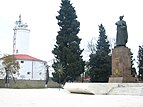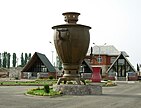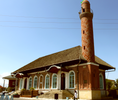Lankaran
Lankaran Lənkəran Lánkon | |
|---|---|
City | |
 | |
| Coordinates: 38°45′13″N 48°51′04″E / 38.75361°N 48.85111°E | |
| Country | |
| Region | Lankaran-Astara |
| Government | |
| • Governor | Taleh Qarashov |
| Area | |
• Total | 70 km2 (30 sq mi) |
| Population | |
• Total | 89,300[1] |
| Time zone | UTC+4 (AZT) |
| Area code | +994 025 25 |
| Website | lenkeran-ih |
Lankaran (Azerbaijani: Lənkəran, ⓘ, Talysh: Lánkon) is a city in Azerbaijan, on the coast of the Caspian Sea, near the southern border with Iran. As of 2021, the city had a population of 89,300. It is next to, but independent of, Lankaran District. The city forms a distinct first-order division of Azerbaijan.
The city is mostly populated by the Talysh people,[3][4][5] and serves as the main urban centre of this people and its ethnic homeland, Talish (Talyshstan).[6][7][8] Historically, the city was the capital of the Iranian province of Talish, of Talysh Khanate, of Russian Lenkoran uezd, of Provisional Military Dictatorship of Mughan, of Mughan Soviet Republic and of Talysh-Mughan Autonomous Republic.
Etymology
The origin of the name "Lankaran" is uncertain. One theory consider it to derive from one of the Persian words, Langarkunān ("the place for dropping the anchor(s)") or Langarkanān ("the place for weighing anchor(s)"). Both meanings simply translate as "sea port." The pronunciation shifted through the years, and Langarkunān became Lankarān or, in the even more simple Talysh pronunciation, Lankon. The other theory links it to the Talysh word lankran ("cane house").[9]
History
It is unknown when the town of Lankaran was actually established. The French archaeologist Jacques de Morgan (died 1924) discovered extremely ancient remains in Lankaran, such as dolmens, graves, and instances of bodies seemingly exposed in a Zoroastrian manner.[10]
With the death of Nader Shah (r. 1736–1747), the Talysh Khanate was founded by Seyyed Abbas, whose ancestors were members of the Iranian Safavid dynasty, and had moved into the Talish region in the 1720s during a turbulent period in Iranian history. From the founding of the khanate until 1828, it was under the suzerainty of the Iranian Zand and Qajar dynasties. In the first half of the 18th century, the Russians gained control over it for a few years during the Russo-Persian War of 1722–1723; in 1732 it was ceded back to Iran by the Treaty of Resht. During the Russo-Persian War of 1804–1813, General Kotlyarevsky, heading the southernmost Russian contingent during the war, stormed and captured Lankaran's fortress. Following the Treaty of Gulistan of 1813, it was ceded to Russia.[11] Qajar Iran would later retake the city during the Russo-Persian War of 1826–1828, but was forced to return it following the Treaty of Turkmenchay (1828), which saw the definite end of Persian influence in the South Caucasus.[11]
Under Russian rule, Lankaran, known as Lenkoran (Ленкорань) in Russian, was the center of the Lenkoran Uyezd of the Baku Governorate. Following the collapse of the Russian Empire, it was a part of the short-lived Azerbaijan Democratic Republic (1918–1920), then became a part of the Azerbaijan Soviet Socialist Republic following the sovietization of Azerbaijan. In 1991, following the dissolution of the Soviet Union, it became a part of independent Azerbaijan.
Geography
There are sandy beaches near Lankaran. Thermal sulphide, chloride, sodium-calcium waters of Andjin (Upper and Lower) mineral springs are situated 12 km west of the town. Also to the west are the ruins of Ballabur castle, near the village with the same name.
Vast area of this region is covered by national parks, where a variety of fauna and flora are preserved. Gizil-Agach State Reserve hosts over 250 kinds of plants, 30 species of fish and more than 220 kinds of birds. Lankaran is also known for Parrotia, or ironwood. It is naturally grown in the region and could be seen in Hirkan National Park. Local myth has it that it is the only wood that sinks in water, hence the name (ironwood). Historically it has been used for heating since it burns for a long time and is not easily extinguished. The Persian leopard (Panthera pardus saxicolous) subspecies of the leopard, lives in the national park as well. In 1937, members of the Opilio lepidus species of harvestman were sighted in the area.[12]
Climate
Lankaran has a hot-summer Mediterranean climate (Köppen climate classification: Csa), with cool, wet winters and very warm, highly humid summers, albeit with infrequent rain.
| Climate data for Lankaran (1991–2020 normals) | |||||||||||||
|---|---|---|---|---|---|---|---|---|---|---|---|---|---|
| Month | Jan | Feb | Mar | Apr | May | Jun | Jul | Aug | Sep | Oct | Nov | Dec | Year |
| Mean daily maximum °C (°F) | 8.7 (47.7) |
9.1 (48.4) |
12.4 (54.3) |
16.9 (62.4) |
23.0 (73.4) |
28.1 (82.6) |
30.7 (87.3) |
30.6 (87.1) |
26.1 (79.0) |
20.8 (69.4) |
14.4 (57.9) |
10.1 (50.2) |
19.2 (66.6) |
| Daily mean °C (°F) | 5.3 (41.5) |
5.8 (42.4) |
8.9 (48.0) |
13.2 (55.8) |
18.9 (66.0) |
23.6 (74.5) |
26.3 (79.3) |
26.1 (79.0) |
22.2 (72.0) |
17.2 (63.0) |
11.1 (52.0) |
6.8 (44.2) |
15.4 (59.8) |
| Mean daily minimum °C (°F) | 1.9 (35.4) |
2.5 (36.5) |
5.4 (41.7) |
9.5 (49.1) |
14.8 (58.6) |
19.2 (66.6) |
21.9 (71.4) |
21.6 (70.9) |
18.4 (65.1) |
13.5 (56.3) |
7.8 (46.0) |
3.6 (38.5) |
11.7 (53.0) |
| Average precipitation mm (inches) | 91 (3.6) |
114 (4.5) |
90 (3.5) |
50 (2.0) |
54 (2.1) |
22 (0.9) |
17 (0.7) |
50 (2.0) |
143 (5.6) |
259 (10.2) |
168 (6.6) |
88 (3.5) |
1,146 (45.2) |
| Average precipitation days (≥ 1.0 mm) | 9.7 | 8.8 | 10.4 | 7.8 | 6.9 | 3.5 | 1.8 | 3.6 | 7.9 | 12.7 | 10.1 | 8.2 | 91.4 |
| Mean monthly sunshine hours | 105.4 | 98.9 | 124.0 | 171.0 | 226.3 | 282.0 | 306.9 | 254.2 | 189.0 | 127.1 | 99.0 | 108.5 | 2,092.3 |
| Source 1: NOAA (Precipitation 1971–1990)[13] Climi e viaggi[14] | |||||||||||||
| Source 2: Hong Kong Observatory (sun only)[15] | |||||||||||||
Economy
Dominating spheres in the economy of Lankaran are vegetable-growing, tea-growing, paddy cultivating, cattle-breeding, citrus plants, beekeeping, fishing, and grain farming.[16] Favourable humid subtropical climate, availability of good arable land, water and sufficient labour resources of the city provides a good basis for agricultural activities as well as the development of agro-processing enterprises. The city is also home to Azerbaijan's first tea plant, built in 1937.[17]
Demographics
Lankaran is the capital of the Talysh region (Talyshistan), the ethnic homeland of the Talysh people, and the main urban and cultural center of this people.[6][7][8]
The vast majority of the population of Lankaran is Talysh,[18] and the rest are Azerbaijanis and other nationalities.
Religion
The religion with the largest community of followers is Islam. The majority of the Muslims are Shia Muslims, and the Republic of Azerbaijan has the second-highest Shia population percentage in the world after Iran.[19] The city's notable mosques include Kichik Bazar Mosque and Boyuk Bazar Mosque.[20]
Culture
As of 2012, the city along with Baku and Ganja participated in Earth Hour movement.[21][22]
Cuisine
Lankaran's cuisine has largely been affected by its multicultural history, hence the large variety of food originating during Talysh Khanate. Lankaran's signature cuisine includes lavangi, Lankaran kulcha, marji plov, white plov, pumpkin plov and turshu kebab.[23][24][25]
Music and media

Lankaran is home to several national folk performers, including the Bacılar (The Sisters) national Talysh folk and dance collective.[26]
The regional channel Janub TV and newspaper Lankaran are headquartered in the city.[27]
Sports

The city used to have a professional football team competing in the top-flight of Azerbaijani football - Khazar Lankaran, which played in the Azerbaijan Premier League. Sporting venues in the city include the Lankaran City Stadium and Lankaran Olympic Sports Complex.[28] The stadium was one of the venues for the group stages of the 2012 FIFA U-17 Women's World Cup.[29]
In 2012, the city won to host European Masters Weightlifting Championship.[30]
Transport
Air
The Lankaran International Airport's international terminal was opened in September 2008.[31]
Railway
The city has rail service from historic terminals in downtown to Baku in the east and Astara in the south.[32][33]
Education
Lankaran State University is located in the city. It was founded in 1991 and it was Lankaran's first university to start courses.
Twin towns
 Monterey, United States (since 2011)
Monterey, United States (since 2011) Iskenderun, Turkey
Iskenderun, Turkey Cerveteri, Italia (since 2013)
Cerveteri, Italia (since 2013)
Gallery
- The central street of Lankaran
- Lankaran Springs & Wellness Resort
- Dosa Park
- Forest Station
- Hotel Gala
- Sutamurdov bridge
- Lankaran, Caspian Sea Coast.
See also
References
- ^ Governorship of Lankaran
- ^ "Əhalisi - LƏNKƏRAN ŞƏHƏR Icra Hakimiyyəti". lenkeran-ih.gov.az (in Azerbaijani). 1 January 2018. Archived from the original on 19 June 2018. Retrieved 19 June 2018.
- ^ "Lankaran". The Columbia Electronic Encyclopedia, 6th ed. Columbia University Press. Retrieved 2023-05-22.
- ^ John Clifton, Calvin Tiessen, Gabriela Deckinga, Laura Lucht. Sociolinguistic situation of the Talysh in Azerbaijan. — 2005, p. 3.
- ^ Allnutt, Luke (2007-10-01). "Azerbaijan: The Struggle To Shape Islam". Radio Free Europe/Radio Liberty. Retrieved 2024-02-08.
Only a few kilometers from the Iranian border, the southeastern town of Lankoran has close ties with Iran. The people in Lankoran are mainly Talysh, linguistically and ethnically similar to Persians.
- ^ a b James Minahan. Encyclopedia of the Stateless Nations: S-Z. — Greenwood Publishing Group, 2002, p. 1837.
- ^ a b Talysh (Talishi) // Encyclopedia of the Peoples of Africa and the Middle East / Jamie Stokes. Consultants: Anthony Gorman, Andrew J. Newman — NY: Facts on File, 2009. — p. 682 — ISBN 9781438126760.
- ^ a b "UNPO: Talysh". unpo.org. Unrepresented Nations and Peoples Organization. Retrieved 2023-06-09.
Largely concentrated in southern Azerbaijan and north-western Iran, with a major population centre in the city of Lenkoran.
- ^ Akopyan & Mosanef 2013, p. 9.
- ^ Minorsky & Elwell-Sutton 1986, p. 656.
- ^ a b Timothy C. Dowling Russia at War: From the Mongol Conquest to Afghanistan, Chechnya, and Beyond pp 728-730 ABC-CLIO, 2 dec. 2014 ISBN 978-1598849486
- ^ Nataly Y. Snegovaya (2007). "Two New Harvestman Species from Lenkoran, Azerbaijan (Arachnida: Opiliones: Phalangiidae)" (PDF). Bulletin of the British Arachnological Society. 14 (2): 88–92. Archived from the original (PDF) on 2018-09-30. Retrieved 2010-12-19.
- ^ "Lankaran Climate Normals for 1971-1990 (WMO Station number: 37985)". ncei.noaa.gov (TXT). National Oceanic and Atmosoheric Administration. Retrieved 22 February 2024.
- ^ "Clima - Lenkoran - Temperature medie (1991–2020)". Climi e viaggi. Retrieved 29 June 2024.
- ^ "Climatological Information for Lankaran, Azerbaijan". Hong Kong Observatory. Archived from the original on October 25, 2019. Retrieved November 17, 2012.
- ^ Business opportunities of the region Archived 2011-07-13 at the Wayback Machine
- ^ "PASHA". www.pasha.az.
- ^ "Lankaran". The Columbia Electronic Encyclopedia, 6th ed. Columbia University Press. Retrieved 2023-05-22.
- ^ Juan Eduardo Campo,Encyclopedia of Islam, p.625
- ^ "Culture in Lankaran" (in Azerbaijani). Retrieved 13 November 2014.
- ^ "Azerbaijan to join Earth Hour". www.news.az. Archived from the original on 29 November 2014. Retrieved 17 November 2014.
- ^ "IDEA campaign to hold Earth Hour action". en.trend.az. 30 March 2012. Retrieved 17 November 2014.
- ^ Azerbaijani Cuisine: Şirniyyat Archived 2008-11-20 at the Wayback Machine (in Azerbaijani)
- ^ Cuisine of Lankaran Archived 2011-07-06 at the Wayback Machine
- ^ Azərbaycanın subtropik zonası Archived 2009-09-14 at the Wayback Machine (in Azerbaijani)
- ^ ""Bacılar" talış folklor mahnı və rəqs kollektivi". Archived from the original on March 4, 2016.
- ^ "Radio-TV yayımı" (in Azerbaijani). Retrieved 13 November 2014.
- ^ "Lankaran Olympic Sport Complex". www.noc-aze.org. Archived from the original on 29 November 2014. Retrieved 18 November 2014.
- ^ "France end Asian domination". fifa.com. FIFA. Retrieved 6 July 2013.
- ^ "Weightlifting Masters". Official Website of European Masters Weightlifting 2012. Archived from the original on 20 April 2011. Retrieved 19 March 2011.
- ^ Lənkəranda çay plantasiyalarının sahəsi genişləndirilir[permanent dead link] (in Azerbaijani)
- ^ "Unknown Host". Archived from the original on 26 February 2020.
- ^ Turizm müəssisələri Archived 2009-04-05 at the Wayback Machine (in Azerbaijani)
- ^ "Sister Cities". City of Monterey. Archived from the original on 2018-04-19. Retrieved 2020-06-26.
Sources
- Akopyan, Alexander; Mosanef, Farbod (2013). "Coins of Langarkunān (Lankarān)". Journal of the Oriental Numismatic Society: 9–11.
- Asatrian, Garnik; Borjian, Habib (2005). "Talish and the Talishis (The State of Research)". Iran and the Caucasus. 9 (1). Brill: 43–72. doi:10.1163/1573384054068169.
- Minorsky, V. & Elwell-Sutton, L.P. (1986). "Lankoran". In Bosworth, C. E.; van Donzel, E.; Lewis, B. & Pellat, Ch. (eds.). The Encyclopaedia of Islam, Second Edition. Volume V: Khe–Mahi. Leiden: E. J. Brill. pp. 656–666. ISBN 978-90-04-07819-2.
- Shahvar, Soli [in Persian]; Abramoff, Emil (2018). "The Khan, the Shah and the Tsar: The Khanate of Talesh between Iran and Russia". In Matthee, Rudi; Andreeva, Elena (eds.). Russians in Iran: Diplomacy and Power in the Qajar Era and Beyond. London: I.B. Tauris. pp. 24–48. ISBN 978-1-78673-336-8.





















